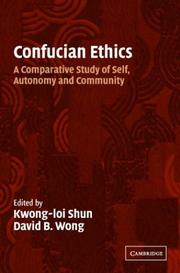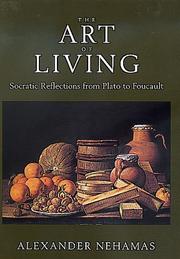| Listing 1 - 10 of 30 | << page >> |
Sort by
|
Periodical
ISSN: 03918181 Year: 1946 Volume: *3 Publisher: Roma: Accademia nazionale dei Lincei,
Abstract | Keywords | Export | Availability | Bookmark
 Loading...
Loading...Choose an application
- Reference Manager
- EndNote
- RefWorks (Direct export to RefWorks)
Ethics --- History --- Periodicals --- Ethics - Periodicals --- History - Periodicals

ISBN: 3727811382 3525537913 9783727811388 Year: 1997 Volume: 155 Publisher: Göttingen Vandenhoeck und Ruprecht
Abstract | Keywords | Export | Availability | Bookmark
 Loading...
Loading...Choose an application
- Reference Manager
- EndNote
- RefWorks (Direct export to RefWorks)
Ethics --- Ethics, Ancient. --- Ethics, Ancient --- Deontology --- Ethics, Primitive --- Ethology --- Moral philosophy --- Morality --- Morals --- Philosophy, Moral --- Science, Moral --- Ancient ethics --- Philosophy --- Values --- Ethics - Egypt. --- Morale --- Morale antique --- Égypte --- Antiquité
Book
ISBN: 9784892056093 Year: 2012 Publisher: Tokyo Reitaku University Press
Abstract | Keywords | Export | Availability | Bookmark
 Loading...
Loading...Choose an application
- Reference Manager
- EndNote
- RefWorks (Direct export to RefWorks)
Ethics, Modern --- Moral development --- Wisdom

ISBN: 0521796571 0521792177 1107158680 0511230745 0511231512 0511316704 0511606966 1280702877 0511229127 0511229968 9780511230745 9780511231513 9780511316708 9780511229961 9780511229121 9780511606960 9780521792172 9781280702877 9781107158689 Year: 2004 Publisher: Cambridge Cambridge University Press
Abstract | Keywords | Export | Availability | Bookmark
 Loading...
Loading...Choose an application
- Reference Manager
- EndNote
- RefWorks (Direct export to RefWorks)
The Chinese ethical tradition has often been thought to oppose Western views of the self as autonomous and possessed of individual rights with views that emphasize the centrality of relationship and community to the self. The essays in this collection discuss the validity of that contrast as it concerns Confucianism, the single most influential Chinese school of thought. Alasdair MacIntyre, the single most influential philosopher to articulate the need for dialogue across traditions, contributes a concluding essay of commentary. This is the only consistently philosophical collection on Asia and human rights and could be used in courses on comparative ethics, political philosophy and Asian area studies.
Confucian ethics. --- Confucianism. --- Confucian ethics --- Confucianism --- Religions --- Religious ethics --- Arts and Humanities --- Philosophy
Book
Abstract | Keywords | Export | Availability | Bookmark
 Loading...
Loading...Choose an application
- Reference Manager
- EndNote
- RefWorks (Direct export to RefWorks)
Ethics --- -China --- Religious life and customs.

ISBN: 0520211731 9780520211735 Year: 1998 Volume: 61 Publisher: Berkeley University of California press
Abstract | Keywords | Export | Availability | Bookmark
 Loading...
Loading...Choose an application
- Reference Manager
- EndNote
- RefWorks (Direct export to RefWorks)
For much of its history, philosophy was not merely a theoretical discipline but a way of life, an "art of living." This practical aspect of philosophy has been much less dominant in modernity than it was in ancient Greece and Rome, when philosophers of all stripes kept returning to Socrates as a model for living. The idea of philosophy as an art of living has survived in the works of such major modern authors as Montaigne, Nietzsche, and Foucault. Each of these writers has used philosophical discussion as a means of establishing what a person is and how a worthwhile life is to be lived. In this wide-ranging, brilliantly written account, Alexander Nehamas provides an incisive reevaluation of Socrates' place in the Western philosophical tradition and shows the importance of Socrates for Montaigne, Nietzsche, and Foucault.Why does each of these philosophers―each fundamentally concerned with his own originality―return to Socrates as a model? The answer lies in the irony that characterizes the Socrates we know from the Platonic dialogues. Socratic irony creates a mask that prevents a view of what lies behind. How Socrates led the life he did, what enabled or inspired him, is never made evident. No tenets are proposed. Socrates remains a silent and ambiguous character, forcing readers to come to their own conclusions about the art of life. This, Nehamas shows, is what allowed Montaigne, Nietzsche, and Foucault to return to Socrates as a model without thereby compelling them to imitate him.This highly readable, erudite study argues for the importance of the tradition within Western philosophy that is best described as "the art of living" and casts Montaigne, Nietzsche, and Foucault as the three major modern representatives of this tradition. Full of original ideas and challenging associations, this work will offer new ways of thinking about the philosophers Nehamas discusses and about the discipline of philosophy itself.
Philosophy --- Conduct of life --- Ethics [Practical ] --- Levenswijze --- Mode de vie --- Morals --- Personal conduct --- Socrates --- Philosophers --- -Scholars --- Ethics, Practical --- Ethics --- Philosophical counseling --- Socrate --- Socrates Constantinopolitanus Scholasticus --- Conduct of life. --- -Conduct of life --- -Ethics, Practical --- Scholars --- Socrates. --- Sokrates
Book
ISSN: 09208607 ISBN: 9789004210141 9004210148 Year: 2011 Volume: 202 Publisher: Leiden Brill
Abstract | Keywords | Export | Availability | Bookmark
 Loading...
Loading...Choose an application
- Reference Manager
- EndNote
- RefWorks (Direct export to RefWorks)
Despite its non-Christian origins, the scheme of the cardinal virtues (prudence, justice, fortitude, and temperance) found wide acceptance in medieval theology, philosophy, and religious literature. The present study is the first to investigate the history of the four virtues in the Latin Middle Ages from patristic times to the late fourteenth century. It examines the position of the cardinal virtues between religious and secularized conceptions of morality and attempts to reveal some distinctly Christian aspects of medieval virtue theory notwithstanding its manifest indebtedness to ancient ethics. Exploring learned and popularizing sources alike, including much unedited material, this study covers a broad spectrum of moral debate during ten centuries of Western intellectual history.
Cardinal virtues --- Ethics, Medieval --- Vertus cardinales --- History of doctrines --- Middle Ages --- Medieval ethics --- Cardinal virtues - History of doctrines
Book
ISBN: 2857570287 Year: 1982 Publisher: Paris PUF
Abstract | Keywords | Export | Availability | Bookmark
 Loading...
Loading...Choose an application
- Reference Manager
- EndNote
- RefWorks (Direct export to RefWorks)
Chinese poetry --- Conduct of life --- Ethics, Practical --- Morals --- Personal conduct --- Ethics --- Philosophical counseling --- Chinese literature --- Dunhuang manuscripts. --- Tun-huang manuscripts
Book
ISBN: 1283259850 9786613259851 9048521416 9789048521418 9789052603667 9052603669 9781283259859 6613259853 Year: 2010 Publisher: Amsterdam Aksant
Abstract | Keywords | Export | Availability | Bookmark
 Loading...
Loading...Choose an application
- Reference Manager
- EndNote
- RefWorks (Direct export to RefWorks)
Lange tijd werd het zo voorgesteld dat middeleeuwse kooplieden verdoemd waren omdat zij winst nastreefden. Pas met de Italiaanse Renaissance en het protestantisme zou er bevrijding gekomen zijn en zou men volop winst hebben mogen maken zonder zich schuldig te moeten voelen. In werkelijkheid hadden theologen al tijdens de volle middeleeuwen alles in het werk gesteld om de rol van handelaars positief te herwaarderen en het winststreven uit de sfeer van het turpe lucrum te halen. Voorwaarde was enkel dat er eerlijke prijzen tot stand kwamen die - bij afwezigheid van bedrog en marktmanipulatie - w
Pricing --- Business ethics --- Commerce --- Price policy --- Price policy, Industrial --- Retail pricing --- Marketing --- Business --- Businesspeople --- Commercial ethics --- Corporate ethics --- Corporation ethics --- Professional ethics --- Wealth --- History. --- History --- Moral and ethical aspects --- Economic history --- Histoire économique --- Morale des affaires --- Histoire --- Professional ethics. Deontology --- Prices --- anno 500-1499
Book
Abstract | Keywords | Export | Availability | Bookmark
 Loading...
Loading...Choose an application
- Reference Manager
- EndNote
- RefWorks (Direct export to RefWorks)
Museology --- Professional ethics. Deontology --- Beroepsethiek --- Beroepsmoraal --- Codes de conduite déontologique --- Codes de déontologie --- Codes of ethics --- Codes of professional ethics --- Conscience professionnelle --- Deontologie --- Deontology --- Déontologie --- Déontologie professionnelle --- Ethical codes --- Ethics [Professional ] --- Morale professionnelle --- Professional ethics --- Professional responsibilities --- Professional responsibility --- Professions--Aspect moral --- Professions--Déontologie --- Professions--Moral and ethical aspects --- Éthique professionnelle --- 069.01 --- Museologie --- INS Institutes --- museums --- ethics --- management --- 069.01 Museologie --- Museums --- Management --- Moral and ethical aspects --- International Council of Museums --- By-laws --- Personnel --- 78.02 --- professional ethics
| Listing 1 - 10 of 30 | << page >> |
Sort by
|

 Search
Search Feedback
Feedback About UniCat
About UniCat  Help
Help News
News